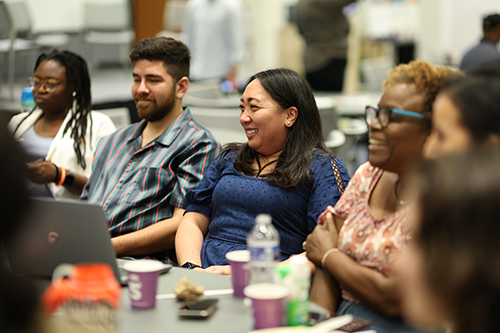
Yesterday, I had the privilege to pay my respects on Black Lives Matter Plaza in Washington, DC as the motorcade carrying the late John Lewis passed on its way to Capitol Hill. A number of short weeks beforehand, Representative Lewis himself had stood on the freshly painted plaza, where he offered the following message: “We must use our time and our space on this little planet we call Earth to make a lasting contribution, to leave it a little better than we found it, and now that need is greater than ever before.”
John Lewis spent his entire 80 years fighting to give everyone the opportunity to meaningfully participate in their society and their economy. His statements were inspiring, but his actions were transformative. As the nation reflects on the amazing life of this Civil Rights icon, we should take a moment to consider one of the tools Rep. Lewis continuously pointed to as a strategy for empowerment: the cooperative business model.
The Federation of Southern Cooperatives/Land Assistance Fund (FSC/LAF) recently posted a tribute to Rep. Lewis (along with other Civil Rights icons C.T. Vivian, Constance Curry and Joseph Lowery) on Twitter. Representative Lewis was one of the leaders who sponsored and supported the initial meeting of 22 cooperatives and credit unions in the spring of 1967 that eventually led to the formation of FSC/LAF. He spent decades working with the Federation to champion legislation to support Black farmers and combat discrimination at the U.S. Department of Agriculture.
As David Thompson writes in a forthcoming Cooperative Business Journal article [1] on John Lewis and the cooperative movement, John Lewis’ path consistently crossed with the cooperative movement.
At eighteen, John Lewis first learned about the power of cooperation while attending the Highlander Folk School in New Market, Tennessee, a social justice leadership training center that hosted Rosa Parks and Martin Luther King, Jr., among other Civil Rights giants. At Highlander, John met Septima Clark, a 60-year-old organizer running a literacy and citizenship workshop out of the back of a food co-op. That program went on to become the Citizenship School Program, which registered millions of Black people in the South for the first time.
At Spellman College, John learned from Ella Baker, National Director of the Young Negroes Cooperative League, who was developing co-ops in Harlem and was later hired by the NAACP to teach about cooperatives across the country. Ahead of the March on Washington, John practiced his speech at a housing co-op. The brick walls absorbed some particularly fervent renditions that had got him kicked out of a hotel room. In 1967, John became Director of the Southern Regional Council’s Community Organization Project, where he worked to establish cooperatives, credit unions and other community development groups in the Deep South. “This was hands-on work, and I loved it,” John later wrote in his autobiography.

In June of 2018, NCBA CLUSA hosted the board of the International Cooperative Alliance, the global apex association of co-ops. We chose to bring the board to Birmingham and Selma, Alabama, so the global cooperative community could learn and be inspired by the U.S. Civil Rights movement. The meeting included a pilgrimage to sites such as the Voting Rights Museum and the Edmond Pettus Bridge, where images of “Bloody Sunday” helped shift public opinion and led to the passage of the Voting Rights Act of 1965. This trip came on the heels of the NCBA CLUSA Board of Director’s adoption of a new vision for the association in the summer of 2017 that seeks to lift up co-ops as the preferred strategy to building a more inclusive economy—one that is stable, sustainable, equitable and offers opportunities for growth and participation for everyone.
Then just last October, the board of NCBA CLUSA adopted a resolution urging a greater recognition of diversity, equity and inclusion in the cooperative identity. Since that time and in concert with the Credit Union National Association, NCBA CLUSA leaders have been working with the International Cooperative Alliance on strategies to lift up DEI as a more prominent facet of the cooperative shared values and principles.
As a cooperative community, we can and should take inspiration from the words of John Lewis. But at the end of the day, it’s not enough to listen; we need to live those words. John Lewis was the youngest person to speak at the March on Washington. His words were powerful, but he’ll be remembered most for the transformative actions those words inspired. Right now, we have a generational opportunity to build a more inclusive economy. It requires our collective time, passion and creativity. As Representative Lewis said in 2015 at the 50th anniversary of the march from Selma to Montgomery, it’s time to “do the work.”
“We come to Selma to be renewed. We come to be inspired. We come to be reminded that we must do the work that justice and equality calls us to do.”
—Doug O’Brien is president and CEO of NCBA CLUSA, where he works with the cooperative community to deepen its impact on the economy.


